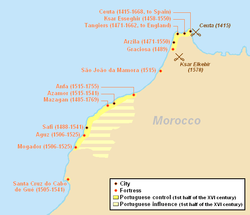The bull praises earlier Portuguese victories against the Muslims of North Africa and the success of expeditions of discovery and conquest to the Azores and to Africa south of Cape Bojador. It also repeats earlier injunctions not to supply items useful in war such as weaponry, iron or timber to either Muslims or non-Christians. In Dum Diversas, the European trade with Muslims was strictly prohibited but Romanus Pontifex gave the King of Portugal an exception, provided that the trade did not include iron, weapons, and wood for building. [11] Overall, there were the threats of ecclesiastical punishments, including excommunication and interdiction, for those who violate the provisions of the papal grant. [12]
The Roman pontiff, successor of the key-bearer of the heavenly kingdom and vicar of Jesus Christ, contemplating with a father's mind all the several climes of the world and the characteristics of all the nations dwelling in them and seeking and desiring the salvation of all, wholesomely ordains and disposes upon careful deliberation those things which he sees will be agreeable to the Divine Majesty and by which he may bring the sheep entrusted to him by God into the single divine fold, and may acquire for them the reward of eternal felicity, and obtain pardon for their souls. This we believe will more certainly come to pass, through the aid of the Lord, if we bestow suitable favors and special graces on those Catholic kings and princes, who, like athletes and intrepid champions of the Christian faith, as we know by the evidence of facts, not only restrain the savage excesses of the Saracens and of other infidels, enemies of the Christian name, but also for the defense and increase of the faith vanquish them and their kingdoms and habitations, though situated in the remotest parts unknown to us, and ...
the said infante ... believing that he would best perform his duty to God in this matter, if by his effort and industry that sea might become navigable as far as to the Indians who are said to worship the name of Christ, and that thus he might be able to enter into relation with them, and to incite them to aid the Christians against the Saracens ...
... to conserve their right and possession, [the said king and infante] under certain most severe penalties then expressed, have prohibited and in general have ordained that none, unless with their sailors and ships and on payment of a certain tribute and with an express license previously obtained from the said king or infante, should presume to sail to the said provinces or to trade in their ports or to fish in the sea,
... since we had formerly by other letters of ours granted among other things free and ample faculty to the aforesaid King Alfonso – to invade, search out, capture, vanquish, and subdue all Saracens and pagans whatsoever, and other enemies of Christ wheresoever placed, and the kingdoms, dukedoms, principalities, dominions, possessions, and all movable and immovable goods whatsoever held and possessed by them and to reduce their persons to perpetual slavery, and to apply and appropriate to himself and his successors the kingdoms, dukedoms, counties, principalities, dominions, possessions, and goods, and to convert them to his and their use and profit – by having secured the said faculty, the said King Alfonso, or, by his authority, the aforesaid infante, justly and lawfully has acquired and possessed, and doth possess, these islands, lands, harbors, and seas, and they do of right belong and pertain to the said King Alfonso and his successors, nor without special license from King Alfonso and his successors themselves has any other even of the faithful of Christ been entitled hitherto, nor is he by any means now entitled lawfully to meddle therewith. [13]

